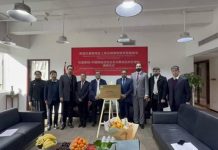BEIJING: Studying the Communist Party of China (CPC) leadership’s proposals for national development, rural teacher Pan Jiuren is excited that the document includes initiatives to tackle the weak links in rural education that he has been concerned about.
Pan’s special interest in the document came after he had attended a symposium for soliciting public suggestions on the 14th Five-Year Plan (2021-2025), chaired by Xi Jinping, general secretary of the CPC Central Committee, in Changsha, capital of central China’s Hunan Province, on Sept. 17.
Pan, deputy headmaster of a primary school in Tashan Township, Hengyang City, was the first of the 10 primary-level representatives to speak at the meeting. He talked about the huge improvements in rural school facilities, as well as difficulties such as the lack of professional music and arts teachers and the brain drain facing some schools. He hoped that more efforts could be made to nurture young teachers in areas with ethnic minorities.
“General Secretary Xi listened to my suggestions carefully. He said the problems I mentioned were quite practical,” 44-year-old Pan recalled.
The country will deepen reform to promote fairness in education and the balanced and integrated development of compulsory education in rural and urban areas, and will improve the quality and level of education in regions with ethnic minorities, according to the Party leadership’s proposals for formulating the 14th Five-Year Plan for National Economic and Social Development and the Long-Range Objectives Through the Year 2035, released on Nov. 3.
“It shows the Party has attached great importance to education, especially education in rural ethnic minority areas,” said the teacher, an ethnic Yao. “Balanced development of education requires more input in rural areas. I foresee a bright future for rural education.”
From July to September this year, Xi presided over seven symposiums to draft proposals for the new development plan. The attendees included entrepreneurs, non-Communist figures, economic and social experts, scientists, experts in education, culture and health, as well as primary-level representatives.
The 2021-2025 period marks the nation’s new journey toward building a modern socialist country, as it will complete the building of a moderately prosperous society in all respects, or Xiaokang, by the end of this year — the CPC’s first centenary goal and its commitment to the people.
Starting in 1953, the five-year plan model has ensured China’s gradual and concrete steps toward modernization, with a set of social and economic development initiatives for each five-year period.
Guided by the CPC’s proposals, the outline of the 14th Five-Year Plan will be drafted before being submitted to the National People’s Congress — the top legislature — for deliberation and approval. Xi has stressed the combination of enhancing top-level design with soliciting public opinion in formulating the new plan, encouraging the general public and all sections of society to make suggestions. Public advice and suggestions were solicited online. From Aug. 16 to 29, over 1 million comments were received, covering fields such as Party building, reform, opening-up, medical care, innovation and social security. Authorities sorted out more than 1,000 suggestions from netizens.
Netizen “Nini” called for strengthening the non-profit nature of public hospitals and improving public health service, through xinhuanet.com, one of the state media channels for collecting public advice on the 14th Five-Year Plan.
The idea of “mutual-help for elderly care” — building a mechanism to make it easier for old people to help one another — from another internet user “Yunfan” was absorbed into the Party’s proposals. – Agencies




